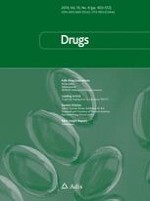Published in:

01-11-2006 | Leading Article
Anti-Tumour Necrosis Factor Therapy for Ulcerative Colitis
Evidence to Date
Authors:
Chandrashekhar Thukral, Adam Cheifetz, Dr Mark A. Peppercorn
Published in:
Drugs
|
Issue 16/2006
Login to get access
Abstract
Infliximab, the chimeric monoclonal antibody directed against tumour necrosis factor (TNF)-α, has profoundly changed therapy for Crohn’s disease (CD). However, for ulcerative colitis (UC), before the publication of ACT 1 and ACT 2 (Active Ulcerative Colitis Trials 1 and 2), there were only a few open-label and controlled trials that evaluated the role of infliximab in the treatment of UC. Results from these earlier studies were equivocal and ambiguous. However, the ACT 1 and ACT 2 trials were large, randomised and placebo-controlled, and have shown that infliximab is significantly more efficacious than placebo in treating both corticosteroid-responsive and -refractory moderate to severe UC. Data from these two studies showed that in patients with moderate to severe UC, treatment with infliximab (5 and 10 mg/kg), compared with placebo, led to significantly higher rates of clinical response, clinical remission and mucosal healing. However, a significant proportion of patients who were receiving oral corticosteroids at the start of the trials, remained on corticosteroids despite infliximab therapy. Additionally, the safety profile of the drug was found to be similar to what has been reported in clinical studies of infliximab in patients with CD.
On the basis of currently available data, we use infliximab as a remission-inducing agent in patients who have moderate to severe UC and are either refractory to or intolerant of mesalazine (5-ASA) products and immunomodulators. Moreover, infliximab seems to be a reasonable therapeutic modality for remission maintenance in those patients with UC in whom mesalazine products and immunomodulators have failed. Although data are limited, infliximab may be considered as a remission-inducing agent in patients with moderate to severe UC which is refractory to oral corticosteroids. However, the role of infliximab in the treatment of UC patients who are dependent on oral corticosteroids is still unclear and, therefore, should be considered only in patients who cannot be successfully transitioned to or are intolerant of oral immunomodulators. Furthermore, infliximab may be an alternative to ciclosporin (cyclosporin) in hospitalised patients with severe to moderately severe but not fulminant UC who do not respond to intravenous corticosteroids. At present, there is insufficient evidence to advocate using infliximab as a first-line agent for UC patients with mild or moderate to severe disease. Future randomised, controlled trials with clearly defined patient populations should further help to clarify the definitive role of infliximab in the therapeutic scheme for UC.